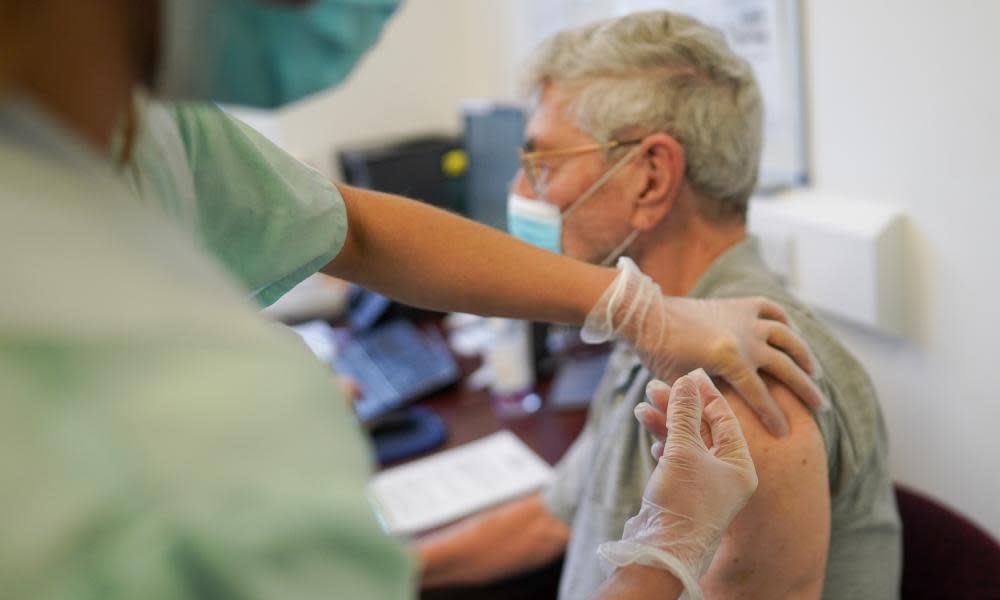Charities say Covid booster rollout for immunosuppressed is ‘chaotic failure’

The programme of giving third Covid vaccinations to people with compromised immune systems has been a “chaotic failure”, charities have said, with fewer than half of those eligible contacted about a third jab before an NHS deadline this month.
Surveys by Blood Cancer UK and Kidney Care UK found that for both groups of patients, between 55% and 60% had yet to be invited to get a third injection, seen as particularly vital for conditions which affect people’s immune systems, as they are generally less protected by two jabs.
The charities said many of those who responded were desperately worried and were struggling to get information about a third vaccination. Some people with blood cancer had resorted to going to vaccination centres without an appointment, pleading for a third dose, Blood Cancer UK said.
Official figures show there were 45,066 confirmed new Covid cases in the UK on Thursday, the highest daily total since mid-July.
Kidney Care UK said the poor communication highlighted what seemed to be a “woeful lack of preparation” for the programme, the guidance for which was agreed on 2 September.
The third dose programme for people with compromised immune systems is separate to the wider rollout of booster jabs being offered to everyone over 50, and others with clinical vulnerabilities, which started on 15 September.
A survey by Blood Cancer UK of just under 2,900 people with blood cancer showed that by 11 October – the date by which NHS England said people should have been sent invitations for third jabs – only 44% had received one.
The charity said ministers appeared to have lost sight of the issue, with Sajid Javid, the health secretary, telling the BBC on 2 October that the “vast, vast majority” of immunocompromised people had been offered the third dose.
Blood Cancer UK said the programme was a “chaotic failure”. Its chief executive, Gemma Peters, said delays were causing “huge distress and anxiety”, adding: “It is now clear that the rollout of the third doses for the immunocompromised has been a failure that was poorly planned and badly implemented.”
A similar Kidney Care UK survey found more than 40% of kidney patients eligible for a third vaccine had not received any contact by 14 October, and of those who did contact a GP or specialist, 80% said it was hard to arrange their appointment.
Fiona Loud, a policy director at the charity, said: “This continued confusion leaves inexcusable exposure to risk for thousands of kidney patients. At this stage of the pandemic we are extremely disappointed to see that immunosuppressed people with kidney disease have not been supported to get this additional protection with barrier after barrier being placed in front of them. It needs immediate resolution.”
Meanwhile, a Guardian analysis of NHS England booster jab data, which includes third jabs for immunosuppressed people, suggests the wider booster programme may also have difficulties, with the data showing no apparent sign of the programme gathering pace since the first figures were released on 1 October.
The Guardian understands that unlike with the first Covid vaccinations, the NHS will not formally work down through groups by clinical priority for standard booster jabs, instead sending invitations to anyone eligible provided it is at last six months since their second vaccination.
Related: More than 2 million people in England have had Covid booster jab
Paul Hunter, a professor of medicine at the University of East Anglia, said that in the week to 12 October there were an average of 161,824 booster or third vaccinations a day in England, around half the rate seen six months ago for second doses.
Hunter said the booster campaign did seem “somewhat more sluggish”, while stressing that this could often be the case when vaccination campaigns entered subsequent stages.
Prof John Drury, a social psychologist at Sussex University and a SPI-B member, said the daily figures for booster shots had a rather “flat” profile which “echoes in some way the overall vaccination programme in the UK, which rather worryingly lost momentum some time ago and has fallen behind that of many other European countries”.
He said one issue could be the removal of most Covid restrictions. “Seeing so many more people resuming pre-pandemic activities may have strengthened the perception in some that the pandemic is receding and therefore boosters are not needed.”
An NHS spokesperson said: “In addition to hospitals and primary care teams identifying and offering patients the third dose, the NHS is now directly contacting all eligible patients to ensure no one is missed.”

 Yahoo News
Yahoo News 
